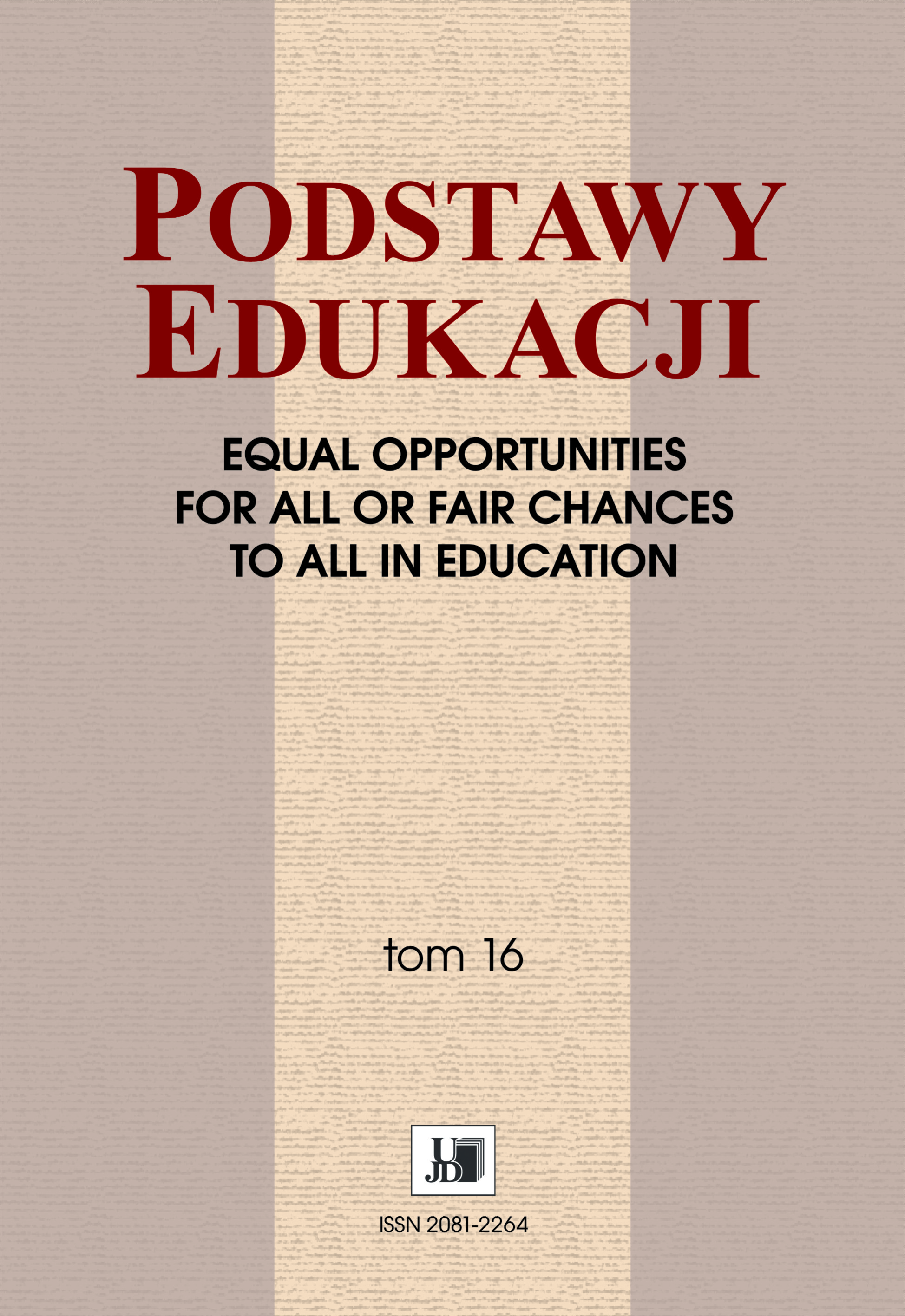Abstrakt
W artykule skupiono się na licencjackim przygotowaniu przyszłych nauczycieli w kontekście umiejętności czytania. Składa się on z części teoretycznej i części empirycznej. Część teoretyczna opisuje i definiuje podstawowe pojęcia ściśle związane z tematem, w tym przygotowanie licencjackie przyszłych nauczycieli, umiejętność czytania itp. Część empiryczna omawia analizę aktualnych programów studiów na Wydziale Pedagogicznym Uniwersytetu Palackiego w Ołomuńcu (Republika Czeska). Celem artykułu była analiza programów studiów i porównanie z wygasającymi, ukierunkowanymi na umiejętność czytania. Autorzy przeprowadzili jakościowe badanie badawcze, aby odpowiedzieć na pytanie, czy przygotowanie licencjackie przyszłych nauczycieli Uniwersytetu Palackiego w Ołomuńcu w kontekście umiejętności czytania jest wystarczające i czy plany studiów w programach edukacyjnych odzwierciedlają wymagania praktyki pedagogicznej. Do badań wykorzystano analizę dokumentów. Analiza dokumentów wtórnych odnosi się do danych już zebranych (Donnellan, Lucas, 2013). Według Hendla (2005) celem analizy jakościowej jest nienumeryczna organizacja danych w celu ujawnienia tematów, prawidłowości, zależności i jakości. W tym kontekście termin nienumeryczny ma zastosowanie nie tylko do danych, ale także do ich przetwarzania. Ze wstępnych badań wynika, że stosunkowo dużej części przyszłych nauczycieli brakuje praktycznego szkolenia nauczycielskiego ukierunkowanego na dydaktykę przedmiotową, opierającą się również na umiejętności czytania. W związku z trwającą pandemią wirusa COVID-19 konieczne było dostosowanie metod i form pracy do rozwijania umiejętności czytania poprzez kształcenie na odległość. Autorzy artykułu uznali za istotne dokonanie analizy programów studiów w kontekście umiejętności czytania i udzielenie odpowiedzi na pytanie, czy przygotowanie licencjackie przyszłych nauczycieli jest wystarczające oraz czy plany studiów programów kształcenia odzwierciedlają wymagania praktyki pedagogicznej w zakresie umiejętność czytania, korzystania z treści wymienionych powyżej, analizy dokumentów. Z wyników badań wynika, że plany studiów programów edukacyjnych odzwierciedlają wymagania praktyki edukacyjnej. Choć fakty opisano w artykule, autorzy uważają, że problematyce rozwoju umiejętności czytania poświęca się wystarczająco dużo uwagi, opierając się na analizie planów nauczania w nauczaniu dla I etapu szkoły podstawowej. Choć termin „umiejętność czytania” pojawia się w dokumentach programowych FEP PE jedynie marginalnie, w planach kształcenia przyszłych nauczycieli szkół podstawowych termin „umiejętność czytania” pojawia się w kilku dyscyplinach. Bez wątpienia dyskusyjne jest, w jakim stopniu powyższe dyscypliny wpłyną na rozwój umiejętności czytania wśród uczniów. Sądząc po treści planów, ich celem jest wyposażenie przyszłych nauczycieli w kompetencje wspierające rozwój umiejętności czytania u dzieci ze szkół podstawowych, po ukończeniu umiejętności czytania i pisania w edukacji przedszkolnej. Dyscypliny te mają charakter czysto dydaktyczny, ponieważ pojawiają się w trzeciej klasie studiów i klasach wyższych, po ukończeniu przez studentów odpowiedniego przygotowania teoretycznego.
Bibliografia
Donnellan, M.B., Lucas, R.E. (2013). Secondary data analysis. In: T.D. Little (ed.), The Oxford handbook of quantitative methods: Statistical analysis (pp. 665–667). Oxford University Press. https://doi.org/10.1093/oxfordhb/9780199934898.013.0028 [Retrieved August 1, 2023]
Dyrtová, R., Krhutová, M. (2014). Učitel – Příprava na profesi. In: P. Krpálek, E. Kadaňová (eds.), Efektivní styl práce vysokoškolského učitele: vybrané kapitoly z vysokoškolské didaktiky (pp. 52–57). Žatec: Ohře Media.
Gillernová, I., et al. (2012). Sociální dovednosti ve škol. Praha: Grada.
Gillernová, I. (2003). Sociální dovednosti jako součást profesní kompetence učitele. Pedagogická orientace, 2, 83–94.
Hendl, J. (2005). Kvalitativní výzkum: základní metody a aplikace. Praha: Portál.
Chudý, Š., Neumeister, P. (2014). Začínajúci učiteľ a zvládanie disciplíny v kontexte 2. stupňa základnej školy. Brno: Paido.
Klement, B. (1969). Jaká je nynější příprava učitelů. Praha: Komenský.
Krpálek, P., Kadaňová, E. (2014). Efektivní styl práce vysokoškolského učitele: vybrané kapitoly z vysokoškolské didaktiky: monografie. Žatec: Ohře Media.
Kyriacou, Ch. (2012). Klíčové dovednosti učitele: cesty k lepšímu vyučování. Praha: Portál.
Nábělková, J. (2020). Case studies: Support the development of key competences in the pre-graduate training of teachers. Olomouc: Univerzita Palackého v Olomouci.
Šimoník, O. (1995). Začínající učitel: (Některé ped. problémy začínajících učit.). Brno: Masarykova Univerzita.
Palečková, J., Tomášek, V., Basl, J. (2010). Hlavní zjištění výzkumu PISA 2009. Umíme ještě číst? Praha: Ústav pro informace ve vzdělávání.
Průcha, J., Mareš, J., Walterová. E. (2009). Pedagogický slovník. Praha: Portál.
Šmelová, E., Fasnerová, M., (eds.). (2011). Pregraduální příprava učitelů primární a preprimární školy v kontextu kurikulární reformy (Undergraduate preparation of teachers in primary and pre-primary school in the con-text of the curricular reform): vybrané kapitoly. Olomouc: Univerzita Palackého v Olomouci.
Špendla, V. (1974). Učitel a učitelská profesia. Bratislava: Slovenské pedagogické nakladatel'stvo.
Tremblay, D., et al., (2017). Learning throughout Life. Gouvernement du Québec – Ministére. In: J. Veteška, et al. (eds.), Kompetence studentů a absolventů škol - teoretická východiska a příklady dobré praxe (pp. 27–28). Praha: Česká andragogická společnost.
Veteška, J., et al. (2017). Kompetence studentů a absolventů škol – teoretická východiska a příklady dobré praxe. Praha: Česká andragogická společnost.

Utwór dostępny jest na licencji Creative Commons Uznanie autorstwa 4.0 Międzynarodowe.
Prawa autorskie (c) 2024 Podstawy Edukacji
